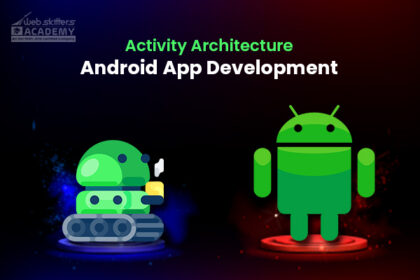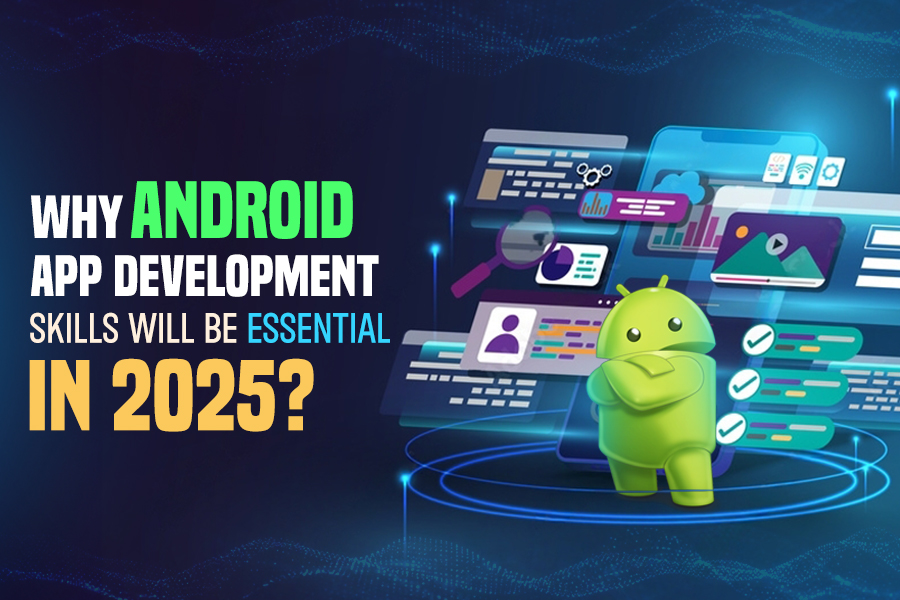
Why Enrol in an Android Development Course? Key Benefits and Career Opportunities
Are you planning a tech career? Do you have a job-oriented course in mind? Well, you have come to the perfect read.
The tech industry is highly competitive. The market is booming with innovations and exciting opportunities. The demand for learned and tech-efficient individuals is high. So, enrolling in a job-oriented technical course might be the career leap you need.
However, if you have planned to take a job-oriented course, it is critical to choose the ideal one. It must be modern, demanding, and offer lucrative opportunities in the job market.
Considering these qualities, an Android development course can be a promising path.
In this comprehensive read, we will explore the perks of joining an Android development course in Kolkata, the intricacies of a structured Android app development training program, and how it can help build a career.
Let us learn.
What is Android Development?
Android development entails creating applications for the Android operating system. It involves designing, building, and testing applications for Android devices like smartphones, tablets, and even smartwatches.
As a learner, you must know that Android is a globally widely used mobile operating system. It offers a vast market for developers to learn innovations. The high demand for skilled Android developers who can create innovative, user-friendly apps is prevalent.
So, if you are planning on entering the tech sphere as a professional Android developer, these are foundation skills and knowledge mandatory –
- Java or Kotlin: The programming languages are the primary coding tools in Android app development. Java is a traditional choice, and Kotlin has gained sufficient popularity due to its modern syntax and features.
- Android SDK (Software Development Kit): It provides the necessary tools and libraries for building Android apps, including components like the Android Studio IDE, the Android Emulator, and various APIs. These interact with the device’s hardware and software.
- XML: The markup language helps define Android apps’ layout and user interface. XML files specify the structure and appearance of elements such as buttons, text views, and images.
- Material Design: Material Design principles are essential for students to create visually appealing and consistent user interfaces adhering to Google’s web design guidelines.
- Version Control: Systems like Git help manage code changes, collaborate with other developers, and track project histories.
These skills and knowledge effectively develop Android apps that cater to users’ diverse needs and contribute to the thriving Android ecosystem.
Benefits of Enrolling in an Android Development Course
However, several tech-based job-oriented courses are available in the market. Why do we suggest an Android development course in Kolkata?
In this section, let us discuss Android development course benefits –
1. Skill Enhancement
Kolkata’s best Android development course will provide a structured and comprehensive learning experience. It will equip students with the mandatory technical and practical skills to excel in this field.
- Solid Programming Foundation: A structured course delves into the fundamentals of programming languages like Java or Kotlin. The mentors ensure a strong understanding of object-oriented concepts, data structures, and algorithms. The foundation tech skills are crucial for building robust and efficient Android applications.
- In-depth Understanding of Android Development Concepts: Students will gain a deep understanding of Android-specific concepts like activities, fragments, intents, services, and content providers. This understanding forms the foundation for skilled design and implementation of various app features and components.
- Hands-On Experience: The courses often incorporate practical exercises, internships, and projects, allowing students to apply theoretical concepts to real-world challenges. This hands-on experience is invaluable for developing problem-solving and debugging skills before getting a job.
- UI/UX Design Principles: In addition to development intricacies, students learn about user interface (UI) and user experience (UX) design principles. This enables them to create visually appealing and intuitive applications that provide a seamless user experience.
2. Certification
Acquiring a certification in Android development significantly enhances career prospects in this competitive domain.
Certifications validate the skills and knowledge, demonstrating proficiency to potential employers. Some of the popular certifications include.
However, certifications vary in terms of content depth and expertise. Some courses cover the core concepts and tools, while others focus on Android SDK deployment.
We recommend opting for a comprehensive Android development certification that covers all aspects of the process, from prototyping to user testing and deployment.
Thorough knowledge makes candidates desirable in reputable organisations and offers a competitive edge during the hiring session.
3. Comprehensive Learning
Most reputable Android development training programs cover vast topics, providing learners a comprehensive understanding of the field.
Some key aspects covered in the courses include –
- Android Studio and Development Tools: Students will master Android Studio, the official IDE for Android development, and other essential tools like Git for version control and Gradle for build automation.
- UI/UX Design: Courses cover design principles, layout techniques, and best practices for visually appealing and user-friendly interfaces.
- App Architecture: Students will learn about different app architectures, such as Model-View-Controller (MVC) and Model-View-View-Model (MVVM), to organise and structure code effectively.
- Data Storage: It entails various methods of storing data in Android apps, including shared preferences, files, databases (SQLite), and cloud storage solutions.
- Networking and APIs: It entails making network requests and handling RESTful APIs and data from external sources.
- Testing and Debugging: The course covers techniques for testing the apps, identifying and fixing bugs, and ensuring quality and performance.
4. Industry Relevance
Staying updated with the latest industry trends and best practices is crucial for success in Android development. The Android development course helps students be on track –
- Learn about new Android versions and features: The course informs students about the latest Android operating system updates and enables learners to leverage new functionalities and APIs.
- Understand emerging technologies: Students learn about emerging technologies relevant to Android development, such as Kotlin, Jetpack Compose, and Flutter.
- Follow industry best practices: This entails following proper industry guidance and adhering to the best practices for coding, design, and performance optimisation.
- Network with other developers: The course helps connect with various Android developers, share knowledge, and learn from their experiences.
The skills, knowledge, and certifications are needed to pursue a successful career in this exciting and dynamic field. Additionally, they help one remain competitive in the domain and land a desirable job.
Career Opportunities in Android Development
The Android development field offers a range of career paths catering to various interests and skill levels. As a beginner, it is vital to learn the job scopes available and the work culture.
Here are some typical roles and job titles after completing a mobile app development course –
- Android Developer: Their fundamental role involves designing, developing, and testing Android apps.
- Senior Android Developer: With more experience and expertise, senior developers lead teams, mentor junior developers, and contribute to complex Android app development projects.
- Android Team Lead: Team leads are responsible for overseeing the work of Android development teams, securing project deadlines and maintaining quality standards.
- Mobile Application Architect: Architects design the structure and architecture of the mobile application, ensuring scalability and performance.
- Technical Lead: Technical leads provide technical guidance and expertise to development teams and work across multiple platforms, including Android and iOS.
Android Development Job Market
The demand for skilled Android developers has been consistently high since the digital domain took over the mobile revolution. Every user has an Android device and needs advanced applications for daily use.
Remember, several factors contribute to this robust job market –
- The rapid growth of the mobile app industry drives the demand for developers who can create innovative and engaging apps.
- Android has a diverse application domain and is used in various sectors, including entertainment, productivity, e-commerce, education, and healthcare. It creates a range of job opportunities for learners in this realm.
- Android is a globally dominant mobile operating system, providing a vast market for developers to target.
Android Developer Salary Expectations
The basic purpose of entering the job market is to leverage your skills and earn your worth. Android development students should, therefore, understand the salary benchmark.
Salary packages depend on experience, location, company size, and specific skills. However, generally, Android developers enjoy competitive salaries compared to other tech professions.
However, knowing about the factors guides beginners effectively through the career path –
- Developers with more years of experience and a proven track record command higher salaries.
- Salaries differ significantly depending on the geographical location. Tech hubs with a high concentration of tech companies often offer higher compensation. For instance, becoming an Android developer in Kolkata offers competitive salaries.
- Larger companies and startups have different salary structures. Larger companies offer more structured compensation packages, while startups provide equity or other incentives.
- Specialised skills like expertise in specific technologies or frameworks increase the earning potential.
When appropriately learned, Android development offers a promising career path with ample opportunities for growth and advancement. The flourishing job market, diverse career paths, and competitive salaries make it an attractive academic choice for individuals.
Types of Android Development Courses and Training Programs
The domain offers various types of Android development courses and training programs. The wide range suits different learning styles and preferences. Here are some standard options to consider when enrolling in a job-oriented course for Android development.
Online Courses
- Massive Open Online Courses: Several popular platforms offer a range of Android development courses taught by industry experts. They are typically self-paced and provide flexible learning options.
- Online Bootcamps: These intensive, short-term programs offer a fast-paced and immersive learning experience. They also include hands-on projects and career guidance.
- Online Tutorials and Resources: Online tutorials, blogs, and YouTube channels provide free or low-cost resources for learning Android development. They are valuable; however, they lack the structure and guidance of a formal course.
Offline Courses
- In-Person Bootcamps: These programs offer an in-person learning experience with direct interaction with instructors and other learners. They entail a supportive and collaborative environment for students to learn from challenges.
- University Programs: Several universities and colleges offer Android development courses as part of computer science or related degree programs. If you are eligible for such programs, they provide a comprehensive education with a strong theoretical foundation.
- Corporate Training: Companies also offer internal training programs for employees to develop Android development skills. These programs are tailored to the organisation’s specific needs and can impart constructive knowledge.
Whichever type of Android development course you opt for, consider the following features –
- Curriculum: Ensure the course covers the essential topics, including Java or Kotlin, Android SDK, UI/UX design, and app architecture.
- Hands-On Projects: Identify courses emphasising practical experience through hands-on projects and internship sessions. These help students apply knowledge and build a portfolio.
- Instructor Expertise: The instructor’s experience and qualifications are crucial. Opt for a course taught by experienced Android developers who provide valuable insights and guidance.
- Community and Support: A supportive community of students and instructors is beneficial for learning and problem-solving and contributes to staying relevant.
- Career Services: Some courses offer career services like resume reviews, mock interviews, and job placement assistance.
At Webskitters Academy, we offer offline Android development courses for beginners planning to get a tech job. These courses are designed for flexibility and a structural learning curve.
Android Development Course Reviews
Reading reviews and feedback from previous students is lucrative before enrolling in an Android development course. It provides the necessary insights into the course content, instructor quality, and overall learning experience.
While the course website offers reviews and testimonials, we advise students to analyse third-party review websites for authentic opinions.
Consider the learning style, goals, and budget to choose the most suitable Android development course and achieve your career aspirations.
Choosing the Right Android Development Course
With multiple options, choosing the perfect course is daunting and demands a designated set of qualities. Here are some factors to consider when selecting an Android programming course –
• Curriculum
Core Topics: Ensure the course covers essential topics such as Java or Kotlin, Android SDK, UI/UX design, app architecture, and everything discussed in this reading.
Depth and Breadth: A good course balances theoretical knowledge and practical application. Real-time work experiences are not negotiable; these are mandatory for securing job prospects.
Updates: Look for courses that stay up-to-date with the latest Android versions and technologies. This will give you a competitive advantage in the job market and provide relevant skills.
• Duration
Time Commitment: Consider your available time and the pace you prefer to learn. Most students opt for monthly-duration online programs for flexibility and ease of learning.
Flexibility: Online courses offer more flexibility in terms of scheduling. Offline courses require physical availability for classes and one-on-one interaction.
Intensive vs. Self-Paced: Based on your learning style, choose between intensive Android development Boot Camps or self-paced courses. It all comes down to the student’s learning preference and ability to align with the curve.
• Cost
Budget: Determine the budget for the course. Consider the value you will receive in terms of skills and career opportunities.
Hidden Costs: Inquire about additional fees, such as certification, exams, or access to online resources. Students must learn about Android development course fees and price break-ups.
Return on Investment: Evaluate the potential return on investment by considering the salary increase and career advancement you can expect.
• Instructor Qualifications
Experience: Identify courses with instructors adept in hands-on experience in Android development and a sturdy industry understanding.
Teaching Style: Consider the instructor’s teaching style and whether it aligns with your learning preferences.
Reviews: Read reviews from previous students to get insights into the instructor’s effectiveness. You can also contact past pupils to better understand the programs.
Comparing Android Development Courses in Kolkata
If you are confused between two or more Android development courses, consider the following –
- Curriculum Comparison: Analyse the course outlines and compare the topics covered.
- Instructor Qualifications: Evaluate the experience and credentials of the instructors.
- Student Reviews: Read reviews for firsthand feedback on the course quality and learning experience.
- Cost-Benefit Analysis: Compare the course cost to the potential benefits like increased earning potential and career advancement.
- Learning Style: Choose a course aligning with your learning style, like self-paced or structured learning.
- Additional Benefits: Some institutes offer additional programs like internships and placement guidance. These are lucrative lanes for exploring the job market and securing a desirable job.
Carefully evaluate these factors when selecting an Android development course. It must suit your academic needs and align with your career goals.
Enrolling in the Best Android Development Course in Kolkata
The opportunities after completing an Android development stretch beyond coding expertise. The modern language enables learners to create unique applications for varied clients and gain competitive skills through growth.
Enrolling in a structured android development course prepares learners for a dynamic and expansive industry.
Webskitters Academy can be your ideal institute to kickstart as an Android developer. You can enrol in a comprehensive Android app development course and learn the best development standards under industry-expert mentors.
We boast a structural internship program for learners to prepare for the job market, and placement guidance cell aids in securing desirable jobs. The course is all you need to begin the Android development journey.
Learn Android Development at Webskitters Academy today!
Search
I Want to Learn...
Category
Explore OurAll CoursesTransform Your Dreams
into Reality
Subscribe to Our Newsletter
"*" indicates required fields
 New Year Special Discount Offer - Upto 20% Off on all Course Fees - 12 Seats Available
New Year Special Discount Offer - Upto 20% Off on all Course Fees - 12 Seats Available 





